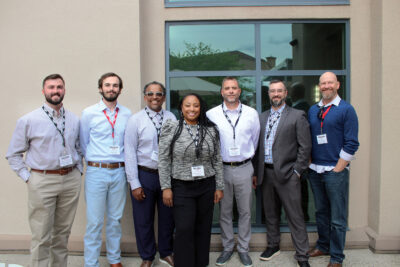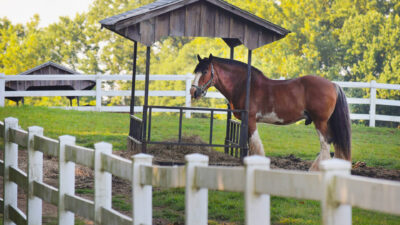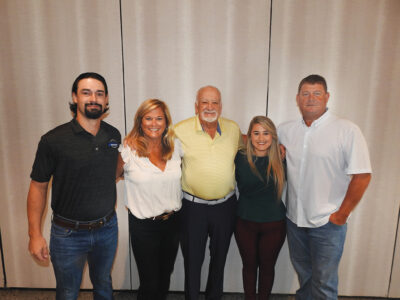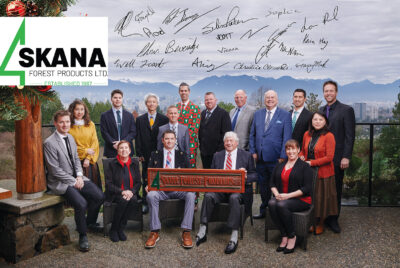
President & CEO of the
American Wood Council
The 2023 Farm Bill is AWC’s most important federal legislative initiative this year, and AWC is pursuing new and creative approaches to getting advocacy wins while we coordinate with partner organizations.
After extensive discussions last year to reach consensus on AWC’s priorities, we landed on three, which include continuing to support the Wood Innovations Grant (WIG) Program, addressing the affordable housing shortage through a pilot program to support wood-constructed affordable housing, and an education accelerator program focused on developing tall mass timber programs for the next generation of engineers and architects. To secure these priorities in the base text currently under development, AWC has taken a more concerted effort to build a presence on Capitol Hill and in the Administration by organizing our first fly-in, hosting a Congressional tour of innovative wood buildings on the National Mall and working with a range of traditional and new partner organizations, including environmental non-profits.
AWC’s First “Fly-in”
In May, several AWC member companies joined AWC staff, National Alliance of Forest Owners and the Southeastern Lumber Manufacturers Association in support of a Farm Bill advocacy “fly-in.” Over three days, AWC members visited with nearly 40 members and staff, targeting House Agriculture Committee members in support of AWC’s Farm Bill priorities.
Overall, the meetings were successful, offering AWC members an opportunity to educate Congressional Members and staff not just about our Farm Bill priorities, but about the wood products industry generally. As the House and Senate Agriculture Committees begin drafting the 2023 Farm Bill, these meetings lay the foundation for supporting the inclusion of our priorities in the base text.
AWC staff will continue the conversation with these members, the House and Senate Agriculture Committees and staff. Additionally, as AWC expands its federal presence, we anticipate targeted advocacy days like this will continue to serve as a tool for highlighting and defending member priorities.
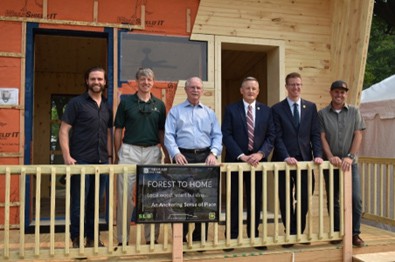
Mass Timber on the Mall
During the Department of Housing and Urban Development’s (HUD) Housing Innovation Summit, AWC hosted the House Working Forest Caucus on the National Mall to tour two modular mass timber buildings and discuss how wood products can provide a sustainable solution to our nation’s housing crisis. Shrouded in wood smoke from the Canadian fires, it was also a poignant reminder of the importance of well-managed forests and healthy wood product markets.
Reps. Bruce Westerman (R-AR), Derek Kilmer (D-WA) and John Rutherford (R-FL), congressional staff, and more joined me in touring two modular mass timber structures temporarily built on the national mall by PathHouse, a design firm based in Oregon, and Timber Age, a firm based in Colorado. Both firms are Wood Innovations Grant recipients, and U.S. Forest Service staff were on hand to highlight the critical role the grant program plays in creating new wood products markets. Additionally, participants heard from Regina Gray, the director of HUD’s Affordable Housing Research & Technology department, about how mass timber is one of the tools HUD is considering in the quest to reduce housing costs nationwide. Both company CEOs spoke eloquently about the potential opportunities for CLT and prefabricated housing, lining up nicely with our second of three Farm Bill priorities – federal funding to support an affordable housing pilot program.
Building Bridges
Both of these events provided the perfect platform to discuss our Farm Bill priorities, and our message resonated.
We have since worked with Senator Ron Wyden (D-OR) and Representatives Andrea Salinas (D-OR) and John Duarte (R-CA) to draft a “marker bill” which included our farm bill priorities. Marker bills, while not themselves destined for the President’s desk, are critical tools for building member support and expressing legislative priorities in text ahead of broad packages like the Farm Bill. Critically, at the request of Senator Wyden’s staff, AWC worked directly with the environmental group Sustainable Northwest to develop compromise legislation, which still reflects the consensus goals of AWC members.
Historically, Sustainable Northwest has been critical of our sector, and their engagement and eventual agreement on our priorities reflects the inroads AWC has made through our willingness to lead with data and what we call “radical transparency.”
These are just a few examples of the way AWC will continue to support our Farm Bill priorities in marker legislation and ultimately within the final law. We continue to be motivated by the strong support we have received from both sides of the aisle, a testament to the efforts our industry continues to make in promoting both our significant contribution to this country’s rural economy and the environment and public health. While the future Farm Bill negotiations may ultimately get bogged down in fights over funding levels, our industry has still left its mark and is well-positioned both in the Bill and in future Congressional initiatives.

